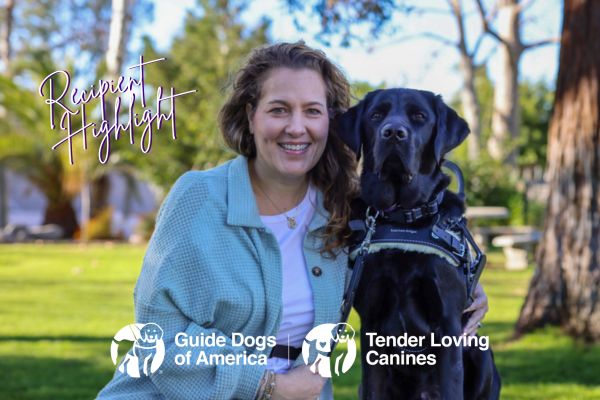

In 2017, U.S. Air Force veteran Kim Boehm was diagnosed with spinal cancer, presumably caused by burn pits in Iraq. After having the tumor surgically removed, she was left with no feeling from the chest down.
In 2020, when the tumor came back, Boehm was treated with radiation therapy that made things even worse. She had to start driving with hand controls and her balance was severely affected.
That’s when Boehm’s husband met Guide Dogs of America | Tender Loving Canines (GDA|TLC) President Russ Gittlen by a chance run-in at the gym.
Gittlen introduced the Boehms to GDA|TLC, the IAM’s favorite charity, and encouraged Kim to apply for a mobility dog.
“I had never thought about having a service dog,” said Boehm. “But as fate would have it, the stars aligned and now I have Jackson.”
A Match Meant to Be
Jackson is a 3.5-year-old black lab. After applying for a dog, Gittlen asked Boehm to speak at a GDA | TLC skeet shoot fundraiser to tell her story so people could see how service dogs help veterans.
That’s where Boehm first met Jackson as a puppy-in-training at the event. Eight months later, Boehm was matched with Jackson to be her mobility dog.
“It turned out that the first dog I met was the dog I ended up being matched with,” said Boehm. “People will tell you, the chance of that is incredibly slim. They have hundreds of dogs in training, so for Jackson to be matched to me and my specific needs is pretty amazing.”
Boehm lives in constant physical pain, but having Jackson seems to help her cope.
“Just in general, I feel like my stress level is down and I don’t focus on the pain so much while he’s with me.”
The main reason that Boehm needs Jackson, though, is for mobility assistance.
“Although I can move my legs, I can’t feel them,” said Boehm. “I can still walk, but I trip a lot and have incredibly bad balance issues.”
Before Jackson, walking in crowds and going in public was stressful and arduous for Boehm.
“I could feel people get frustrated with how slow I was walking, and they couldn’t understand why, so I avoided going to crowded places,” said Boehm.
If she did go out, Boehm said she’d have to cling to a family member the whole time and would always research how busy places were going to be.
Having Jackson fixed that. Boehm says that people see him and give her a little more “space and grace” because it’s clear that something is going on.
“Now, I can just get in the car and go,” said Boehm. “I have the dog, and we can do this. There’s not that forethought and worry about getting bumped over or making an excuse for why I don’t want to go somewhere.”
Boehm had four deployments while in service, two of them in combat. Although Jackson is with Jackson due to her physical disability, he also helps her cope with PTSD.
“When I have my triggers, Jackson brings me back to the moment, he helps me to live in the moment and not get lost in those things,” said Boehm. “It’s just an extra bonus!”
The GDA|TLC Family
Boehm raved about the experience of being welcomed into the service dog community by GDA|TLC.
“Arriving at GDA|TLC, they don’t make you feel like they’re doing some great thing for you,” said Boehm. “They welcome you and tell you that they’re glad you’re there and that you’re part of the family now.”
Boehm still keeps in touch with Jackson’s “puppy raiser.” A puppy raiser is a volunteer who keeps a puppy meant for service until they are ready to enter training with GDA|TLC. Puppy raisers have a GDA|TLC puppy for about a year and raise the puppy in a specific way to acclimate them for future service work.
“I was in the Air Force for 21 years, part of an incredible leadership team and doing amazing things,” said Boehm, “and then I went to this place [GDA|TLC campus] and it’s better-run than the military, plus it’s run with love and care and a family atmosphere in addition to everything running with precision. It feels like family. I am just full of gratitude for them.”
Life With Jackson
GDA|TLC matches service dogs with their handlers based on personality and skillset. Boehm needed a relaxed dog who was ok with moving at her pace.
Jackson, being a “chill” and less energetic dog, fits her lifestyle perfectly.
Boehm is a registered dietician at a hospital. She has a husband and two children and says that Jackson brings everyone in her life more joy, at work and at home with her two other family dogs.
“It’s like having your best friend with you all the time. I feel freer. He makes everything better,” said Boehm. “There are no downsides.”
Initially, Boehm thought getting Jackson meant taking a dog from someone else who needs one, but after experiencing life with Jackson, she can’t imagine life without him.
“I am eternally grateful for this amazing gift. It’s life-changing,” said Boehm. “I’m still going to have my disability but it’s not as much of a thought anymore. This is the next best thing to not being disabled.”